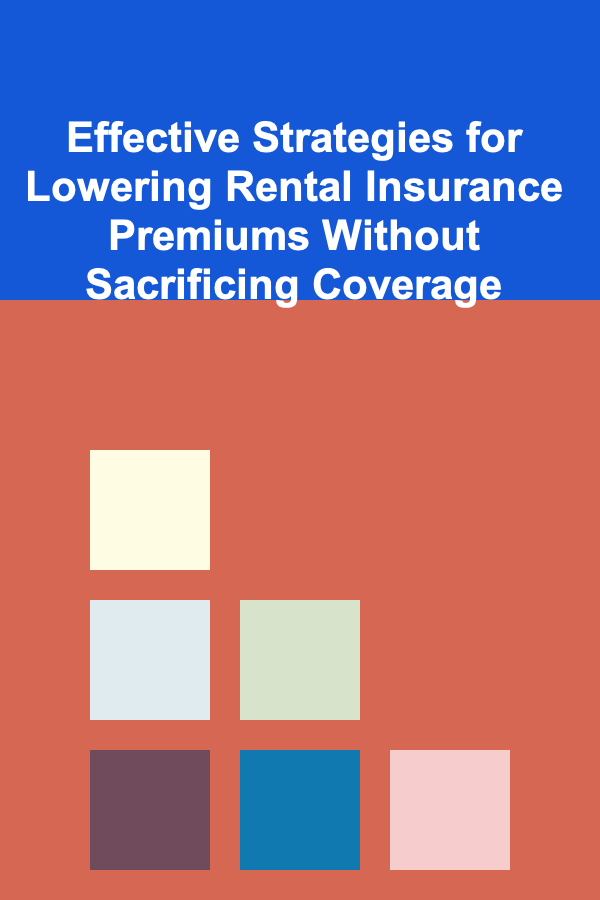
Effective Strategies for Lowering Rental Insurance Premiums Without Sacrificing Coverage
ebook include PDF & Audio bundle (Micro Guide)
$12.99$10.99
Limited Time Offer! Order within the next:

When it comes to rental insurance, everyone wants to find the perfect balance between affordable premiums and comprehensive coverage. The key to achieving this is using effective strategies that can lower your rental insurance premium without compromising the level of protection you receive. This guide outlines actionable strategies you can employ to save on your rental insurance while ensuring that you are still adequately protected from the risks you face.
Shop Around and Compare Providers
The first step to finding the best rates on rental insurance is to shop around. Insurance companies offer varying premiums for similar coverage, so it's essential to compare different providers. Many insurers offer online comparison tools where you can input your information and instantly see quotes from different companies. Take advantage of these tools to identify the most affordable option.
Tips for Effective Comparison:
- Use online comparison websites to get a broad picture of pricing.
- Ensure that you're comparing the same coverage levels across different companies to make an apples-to-apples comparison.
- Don't automatically settle for your current insurer; switching to a different provider might save you money.
Opt for Higher Deductibles
A deductible is the amount of money you pay out-of-pocket before your insurance kicks in. By choosing a higher deductible, you can lower your monthly premiums. However, this means you'll need to be prepared to pay more upfront in case of a claim. Before opting for a higher deductible, assess your ability to cover that cost in the event of an emergency.
How to Find the Right Balance:
- Consider how much you can realistically afford in the event of a claim. If you choose a high deductible but can't afford the amount in case of an accident, it could end up being a costly decision.
- Start by increasing your deductible modestly, and see how much it reduces your premiums. If it's a significant reduction, you may want to maintain that higher deductible.
Bundle Your Insurance Policies
Insurance companies often provide discounts for customers who bundle multiple policies together, such as combining your rental insurance with your car insurance, health insurance, or life insurance. Bundling policies can result in substantial savings.
How to Maximize Savings with Bundling:
- Ask your insurance provider about bundling options and discounts.
- Ensure that bundling your policies doesn't cause you to lose out on better coverage or rates with other providers.
- Don't feel pressured to bundle with the first insurer; shop around for the best combined rates.
Increase Your Security Measures
Insurance companies frequently offer discounts for tenants who take steps to improve the security of their homes. These measures reduce the risk of theft, vandalism, or damage, which makes it less likely that the insurer will have to pay out a claim. Some of the most common security improvements include installing security cameras, deadbolt locks, smoke detectors, and fire extinguishers.
Specific Security Features to Consider:
- Deadbolt locks: These can lower your premium by reducing the likelihood of break-ins.
- Security system: A monitored home security system may lead to discounts from your insurer.
- Smoke and carbon monoxide detectors: Many insurers offer lower rates for homes with these life-saving devices.
- Fire extinguishers: Installing fire extinguishers, especially in kitchens, can help prevent major damage and potentially lower your premiums.
Review and Adjust Coverage Regularly
Over time, your rental needs and the value of your possessions can change. It's important to review your coverage annually or after any major life changes. You may be able to lower your premiums by reducing coverage on items that are no longer as valuable or by adjusting coverage to better suit your current circumstances.
How to Adjust Your Coverage:
- Regularly assess your belongings and remove any high-value items you no longer own or that have depreciated in value.
- If you've made significant improvements to your home (e.g., added a home office), update your coverage to reflect these changes.
- Consider reducing coverage on personal property that is not essential to you, such as high-value electronics or collectibles, if the cost to insure them outweighs their worth.
Maintain a Good Credit Score
In many regions, insurance providers use your credit score to determine your premium rates. A higher credit score often correlates with a lower risk of filing claims, which can result in lower premiums. While it's not always in your control, maintaining a good credit score can be an effective way to lower your rental insurance premiums.
Credit Score Tips for Lowering Premiums:
- Pay your bills on time to avoid late fees and interest, which can negatively impact your credit score.
- Keep credit card balances low and avoid maxing out your credit limit.
- Monitor your credit report for any errors or discrepancies that could negatively affect your score.
Opt for Actual Cash Value Instead of Replacement Cost
Many rental insurance policies offer two types of coverage: Actual Cash Value (ACV) and Replacement Cost Value (RCV). ACV compensates you for the depreciated value of your property, while RCV reimburses you for the cost of replacing your items with new ones.
While RCV provides more comprehensive protection, it also comes with higher premiums. Opting for ACV can save you money, but keep in mind that you'll receive less in the event of a claim, as the reimbursement will be based on the current value of the item rather than what it cost to replace it.
When to Choose ACV:
- If your possessions are older or depreciating in value, ACV may be a more affordable option.
- If you have a tight budget but still want coverage for your belongings, ACV allows you to save on premiums without entirely sacrificing protection.
Claim History Matters
Insurance companies often raise premiums after you make a claim. To keep premiums low, it's best to avoid filing claims for smaller losses that could be covered out-of-pocket. Instead, consider handling minor repairs or damages without involving your insurer.
Tips to Avoid Unnecessary Claims:
- Only file a claim for significant losses that exceed your deductible and would be difficult to cover otherwise.
- Consider taking preventive measures to avoid damage or theft, such as regular maintenance and security improvements.
- Track your claims history, as multiple claims can cause insurers to raise premiums significantly.
Consider a Pay-Per-Month Payment Plan
Many insurance companies offer discounts for customers who pay their premiums annually rather than monthly. If you have the ability to pay upfront, this can save you money in the long run. However, if you prefer a monthly payment plan for budget reasons, be sure to check if there are any additional fees for spreading out your payments.
Pay-Per-Year vs. Pay-Per-Month:
- Paying annually: If you can afford it, paying the full premium at once can reduce your overall cost, as many insurers offer a discount for lump sum payments.
- Paying monthly: If monthly payments are necessary for your budget, look for providers who don't charge extra fees for this payment plan.
Conclusion
Lowering your rental insurance premiums without sacrificing coverage requires a combination of shopping around, making smart adjustments to your policy, and taking proactive steps to reduce risk. By implementing the strategies outlined in this guide, you can ensure that you're not only saving money on your premiums but also protecting your property and personal belongings from unforeseen risks. Always remember that your insurance should provide peace of mind, so make sure you strike the right balance between affordability and comprehensive coverage.

Beyond the Firewall: Advanced Techniques in Cybersecurity Analysis
Read More
How to Maintain Your Home's Exterior Paint
Read More
Stylish and Affordable: Top Budget-Friendly Fashion Ideas for Every Season
Read More
How to Leverage AI for Predictive Marketing
Read More
Discovering the Ancient City of Troy: From Myth to Reality
Read More
10 Tips for Budget-Friendly Boating Vacations
Read MoreOther Products

Beyond the Firewall: Advanced Techniques in Cybersecurity Analysis
Read More
How to Maintain Your Home's Exterior Paint
Read More
Stylish and Affordable: Top Budget-Friendly Fashion Ideas for Every Season
Read More
How to Leverage AI for Predictive Marketing
Read More
Discovering the Ancient City of Troy: From Myth to Reality
Read More